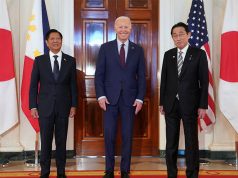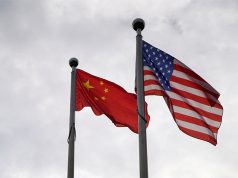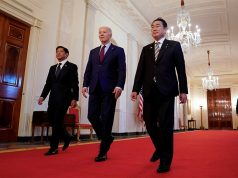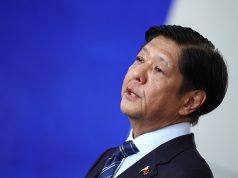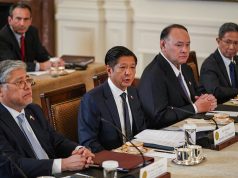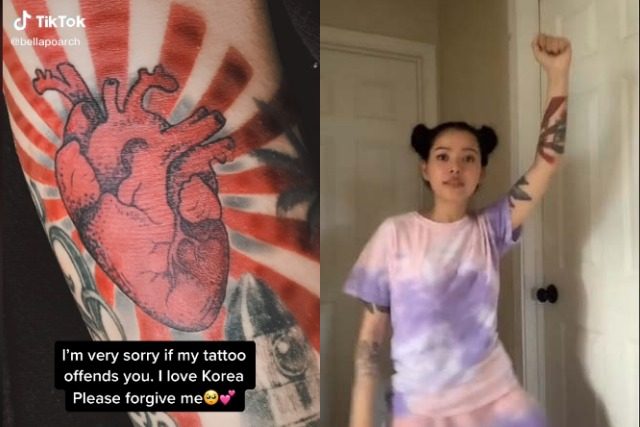
What started as a mistake of a Filipino-American TikTok user turned into a word war between some Koreans and Filipinos that dominated Twitter since Tuesday.
The mudslinging later prompted conversations on counter-racism and history between South Korea and the Philippines on the micro-blogging platform.
It started on TikTok
A TikTok star named Bella Poarch, a Filipino who lives Hawaii, posted a TikTok dance video over the weekend where a tattoo that looks like the infamous Rising Sun symbol could be seen on her arm.
The Rising Sun symbol or flag, a sunburst with 16 rays, was used by the Japanese military during World War II and continued to appear in some advertisements and commercial products in Japan after.
For South Koreans, the symbol reminded them of the Japanese militarism rule and even sees it as comparable to the Nazi swastika.
Despite the dark history associated with it, the Rising Sun symbol inspired many similar artworks and logos, such as the tattoo art on Poarch’s arm.
Following intense criticisms from some Korean accounts on the platform, Poarch uploaded another video where she apologized for the tatto design.
“I’m very sorry if my tattoo offends you. I love Korea. Please forgive me,” she said.
Poarch also tweeted her apology on September 6. She admitted that she was not aware of the history behind the rising sun when she got the tattoo six months ago.
“At that time, I didn’t know the history. But when I found out, I immediately had it covered and scheduled for removal. I am ashamed of myself for not doing my research. I sincerely apologize,” she said.
I apologize to Koreans because 6 months ago I got a tattoo of the red sun with 16 rays. At that time, I didn’t know the history. But when I found out, I immediately had it covered and scheduled for removal. I am ashamed of myself for not doing my research. I sincerely apologize.
— Bella Poarch (@bellapoarch) September 6, 2020
In another tweet, she bared that the Rising Sun symbol could be seen everywhere in Hawaii.
“I live in Hawaii and I see a lot of people using the red rising sun symbol in clothing, cars and jewelry. Please educate yourselves and learn more about it because it came from a terrible history. It is very offensive to a lot of people. Please learn from my mistake,” she said.
Unfortunately, the public spat did not end there. Some Filipinos came to defend Poarch against some name-calling and other derogatory terms against Filipinos in general.
They made screenshots of these supposed insult-laden comments and shared them on Facebook and Twitter under the hashtags #CancelKorea and #CancelToxicKoreans.
The messy exchange between these Korean and Filipino accounts became the hot topic online on Wednesday.
Poarch also sided with the Filipino users, thus adding fuel to the fire, on the same day.
Y’all can attack me. I’m ok with that. But when y’all attack Philippines and make fun of them, that’s when I lose my shit.
— Bella Poarch (@bellapoarch) September 9, 2020
Why #CancelKorea could be problematic
The responses from Filipino users, which were mostly fan accounts of Korean groups, were also filled with the same derogatory and discriminatory insults toward South Koreans.
Other online users claimed their Filipino “pride” by citing the Philippines’ Miss Universe titles, the number of languages, and indigenous art and culture.
Some online personalities and experts observed that such purported crude rebuttals showed the Filipinos’ lack of knowledge in history and current affairs.
Oh kababayan baka naman nakiki #CancelKorea ka dyan tapos racist ka din naman? 🤪🥴HAHAHAHAHAHAHAHAHAHAHA ayus-ayusin mo…
Posted by Tidbits Choi on Wednesday, September 9, 2020
Fake patriotism?
Singer Kakie Pangilinan, a vocal social media personality, pointed out that Filipinos also tend to be discriminatory to their countrymen.
“Why is cancel korea trending as if Pinoys aren’t racist af too?” she asked.
“Come on now. You know those are individuals with deep set discrimination, not a cultural predisposition that a hashtag is going to change,” she added.
Award-winning writer Jerry Gracio also addressed the supposed pettiness of these online users when they were perceived silent on China’s aggressive harassment against Filipino fishermen.
“Cancel Korea agad-agad dahil tinawag tayong poor, short, at uneducated. Pero hindi natin ma-cancel ang China na matagal nang itinataboy ang ating mga mangingisda, kinakamkam ang ating teritoryo, niyuyurakan ang ating pagkatao,” he said.
Other pundits questioned how they could assert being proud of being a Filipino when they do not speak up against human rights violations under the current administration.
“Tigilan niyo ko ng proud Filipino tweets niyo kung dedma naman kayo sa kawalanghiyaan ng rehimeng ito,” the user wrote.
Forgotten history on the impact of war crimes
News correspondent Regine Cabato expressed disappointment over the lack of focus on common grievance of the countries, citing the comfort women during World War II.
“Sana we put this energy into a common grievance of both countries like, I don’t know, comfort women,” she said.
Comfort women were young girls from different countries, which include the Philippines and South Korea, whom the imperial Japanese army forced into prostitution during World War II.
In 2018, President Rodrigo Duterte drew backlash after he ordered the removal of the comfort woman statue in along Roxas Boulevard in Manila.
Content creator @ItsACsLife likewise noted that they seemed to have forgotten the war crimes of Japan against both Filipinos and Koreans.
“I think this is the perfect time to discuss the war crimes Japan committed towards the Filipinos and the Koreans. May common denominator tayo. Ang kaibahan lang, sila hindi nakakalimot, tayo, parang wala tayong pakialam,” he said.




